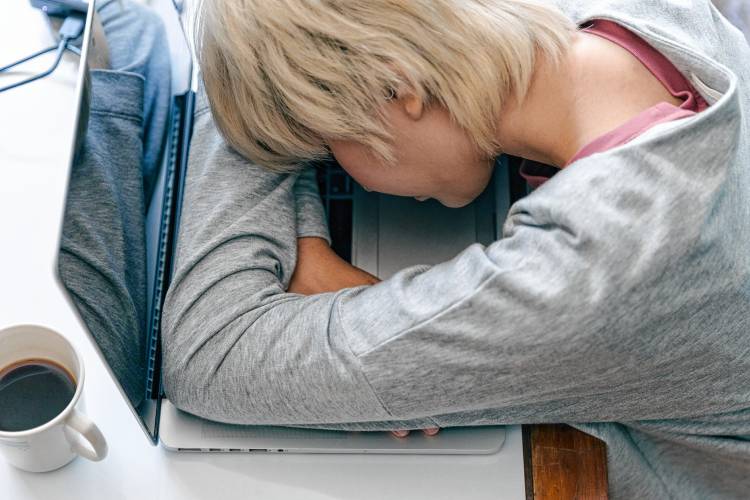Aging with Adventure with Eric Weld: You are getting very sleepy: Why sleep matters so much more than we realize
| Published: 01-11-2024 10:40 AM |
Raise your hand if you get enough sleep.
If you raised your hand, well done. Because in America, a large percentage of us do not sleep or rest enough, and the resultant detriments to our health are too numerous to count.
More than one-third of adults do not get adequate sleep, according to a Centers for Disease Control and Prevention (CDC). Nearly 40% report falling asleep during the day without meaning to at least once a month. More alarmingly, one in 20 of us has fallen asleep while driving during the past month. Drowsy driving is responsible for more than 1,500 deaths and 40,000 injuries per year, estimates the National Highway Traffic Safety Administration.
Sleep deprivation is at such a severe state in the United States that the CDC declared it a public health epidemic in 2014.
I write about adventure, aging, the adventures of aging and related topics in this space. Well, few lifestyle practices are more important to healthy aging and robust adventure than giving our bodies enough sleep and rest. It’s right up there alongside exercise and diet/hydration.
Yet, for some reason, in this country in particular, sleep isn’t treated with the same priority as diet and exercise. As a society, we have developed a collective pride around working hard and emphasizing productivity. “I’ll sleep when I’m dead,” goes the common trope. It’s as if sleeping has taken on a stigma of laziness instead of the essential rejuvenating recharge that it is.
Modern technology isn’t helping either. Ubiquitous screens accompany our every waking moment, including bedtime. Depending on where you live, noise and light pollution may be deterring or hampering your sleep. Add in rigid work schedules and our harmful practice of collectively changing our clocks twice a year (more on that later), and it’s little wonder so many of us struggle to get enough sleep.
“Everyone should be getting enough sleep,” notes Karin Johnson, MD, a professor of neurology at the University of Massachusetts Chan Medical Center, Baystate campus. “We need sleep to power our brain and our energy source. If you don’t get enough sleep, your brain won’t have the energy it needs, for decision-making, focusing attention, processing memory.”
Article continues after...
Yesterday's Most Read Articles
Lack of sleep can also lead to cardiovascular disease, obesity, Type 2 diabetes, depression, cancer and Alzheimer’s, multiple studies have concluded.
“People talk about the three pillars of health: diet, exercise and sleep,” says NedraSahr, a nutritionist and nutrition coach in Eliot, Maine. “Sleep is not one of the three pillars. It is the foundation. One can go without exercise or eating without dying. But you can’t go without sleep for any length of time.”
How much sleep should you be getting?
Johnson says that most people need seven to eight hours of sleep per night. Some can get by with six, others need nine. There are stories of people getting by on three or four hours, but that’s extremely unusual and should not be emulated.
“Number one, listen to your body” to determine if you’re not getting adequate sleep, says Johnson. “If you’re falling asleep watching TV, if you’re feeling tiredness, sleepiness during the day, chances are you’re not getting enough sleep day to day.”
Older people tend to get less sleep. As we age, we tend to turn in earlier and wake up earlier.
Many of us also take a little longer to fall asleep as we age, and may sleep lighter. These changes in sleep patterns and quality are likely due to a convergence of physiological, behavioral and psychological shifts as we age. Daily activity typically decreases. Our hormonal makeup stirs. Our homeostatic sleep pressure decreases.
A common myth holds that older people need less sleep, but evidence doesn’t support that.
True, older people tend to get less sleep, but the overwhelming majority of adults need the usual seven to nine hours whatever age we are.
Sleep isn’t just about duration. Even those of us who feel we are getting enough sleep need to check the quality of our sleep. There are four key components to adequate rest, says Johnson.
Optimal sleep entails duration, but also a consistent sleep schedule, times of day that are more advantageous, and engaging certain sleep stages (quality).
Thankfully, improving our sleep, for the large majority of us, is within our power, and not difficult to do.
Both Sahr and Johnson emphasize the importance of a consistent sleep routine. Going to sleep and waking up at the same times, in general, every day and night will enhance sleep quality by regulating your body and brain to the expectation of the activity.
For optimal sleep, customize your sleep space. Make it dark, advises Sahr, by using blackout shades or curtains, or wearing an eye mask if necessary. Ideally, she says, you have no electronics in the bedroom. And no red, blue or yellow lights. Keep the bedroom on the cool side, between 65 and 69 degrees, to help the body temperature drop about one degree, for best sleep, she says. (Personally, I like my nights at a snappy 56 degrees, with heavy blankets. And it has the added benefit of saving on heating fuel.)
Ease into sleep by preparing your body and mind for that activity. Stop eating at least three hours before bedtime, says Sahr. And refrain from caffeine or alcohol at least four hours before going to bed. Turn off the TV or screen an hour and a half before sleep.
“My patients that do best are the ones who take it seriously,” says Johnson, “turn off the lights an hour before bed, no screen, no eating, etc.”
And importantly, Sahr adds, “get outside for at least 30 minutes every day, morning preferred.”
A fatigued body and mind will rest more deeply than an inactive one.
What do you get for all those adjustments? What are the rewards of getting adequate sleep?
In the big picture, ample quality sleep will enormously assist your prospects for a longer life by lowering your risks for health problems like heart disease, diabetes, dementia and others. But more importantly, good sleep will almost certainly enhance the quality of whatever years you remain alive (i.e., more, better adventures!). It will help keep your stress, weight and blood pressure down. Good sleep will strengthen your immune system so you’ll be sick less often. It will boost your memory and brain health so you can perform tasks more effectively. Your body will be better rested and have more energy throughout the day.
Sahr quotes halting statistics about the effects of inefficient sleep. “If you get one night with four hours of sleep, you get a 70% drop in killer cells,” she says. We want to help our killer cells, they are natural white blood cells that hunt and destroy infected, diseased and cancerous cells, deterring sickness from spreading in our bodies. “One hour less of optimal sleep can result in a 40% deficit in your ability to learn.”
You get the idea. Shortchanging ourselves on sleep has far-ranging detriments. Sleeping well and enough — as with eating, drinking healthy fluids and getting exercise – can give you a longer, healthier, happier life.
Imagine what your life could look like if you combined all three pillars: adequate sleep, diet and exercise. (Gasp.)
Our societal practice of changing our clocks twice a year is a controversial topic. There’s widespread agreement that the practice harms our sleep schedules with detrimental effects that can last for weeks or months, for some, after the scheduled time change.
Efforts are underway to halt this harmful practice by permanently instating Daylight Savings Time (DST). The scientific community mostly agrees this would be even more harmful than switching times twice a year because of the sacrifice of morning light and the negative effects on our circadian rhythms.
The healthiest option would be to end DST and adhere to Standard Time (ST) year round. ST is more aligned to our natural rhythms and encourages earlier, healthier sleep schedules.
We’ve learned a lot about the importance of sleep over the past 30 years as it has increasingly become the focus of high-profile research. Simple online searches of “the benefits of sleep” will turn up scads of further details for those interested in more information.
In addition to sleep, we need non-sleep rest and restful activities throughout the day. Activities such as yoga, relaxation, meditation, massage, deep breathing and stretching can help our bodies and minds rejuvenate. Short daytime naps can also be restorative, but timing is important. “The best nap is a 20-minute nap,” says Sahr. And never after about 4 p.m.
A healthy life is about balance. Give and receive, good with some bad, stress (limited) and calm, risk and safety, yin and yang. Work and rest. As a society, we Americans have focused well on the work part. For our health, longevity, happiness and ability to adventure late into life, we also need to balance work with good rest.
Get some sleep.
Eric Weld, a former Gazette reporter, is the founder of agingadventurist.com




 Speaking of Nature: Capturing my Bermuda nemesis: The Great Kiskadee nearly evaded me, until I followed its song
Speaking of Nature: Capturing my Bermuda nemesis: The Great Kiskadee nearly evaded me, until I followed its song Easthampton author Emily Nagoski has done the research: It’s OK to love your body
Easthampton author Emily Nagoski has done the research: It’s OK to love your body Earth Matters: Honoring a local hero: After 40 years, Hitchcock Center bids farewell to educator and creative leader, Colleen Kelley
Earth Matters: Honoring a local hero: After 40 years, Hitchcock Center bids farewell to educator and creative leader, Colleen Kelley Valley Bounty: Delivering local food onto students’ plates: Marty’s Local connects farms to businesses
Valley Bounty: Delivering local food onto students’ plates: Marty’s Local connects farms to businesses
